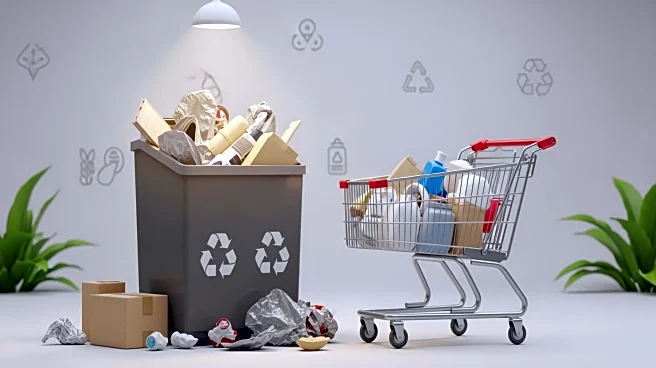What's Happening?
A recent study has highlighted the impact of supercenters, such as Walmart and Target, on consumer waste in the United States. Researchers found that the presence of these large retailers, which sell groceries
alongside general merchandise, leads to a significant increase in consumer waste due to overpurchasing. The study utilized a difference-in-differences analytical method to compare consumer waste trends in counties with supercenter launches to those without. Results showed that the opening of a supercenter can increase consumer waste by up to 7%. This trend is more pronounced with new supercenter openings compared to conversions of existing stores into large-format ones. The study underscores the role of supercenters in stimulating mass consumption through pricing strategies and location choices that encourage larger basket sizes during shopping trips.
Why It's Important?
The findings of the study are significant as they highlight the environmental and societal impact of supercenters on consumer behavior and waste generation. The United States generates nearly 300 million tons of consumer waste annually, costing billions to manage. This waste contributes to environmental degradation and poses challenges for sustainable development. The study suggests that policies encouraging behavioral shifts, such as pay-as-you-throw, could mitigate the supercenter effect. Additionally, promoting local vendors and stores could reduce waste and support local economic growth. The research calls for a reevaluation of retail strategies to balance profitability with environmental responsibility.
What's Next?
Potential solutions to address the supercenter effect include implementing policies that encourage sustainable consumption and developing stronger circular economy channels. Cities are adopting pay-as-you-throw policies to charge consumers based on waste volume, promoting waste reduction. Initiatives to support local vendors and stores are gaining momentum, which could lead to smaller, more frequent shopping trips and less waste. Leveraging the reuse economy through thrift stores and online platforms like Facebook Marketplace could also help circulate surplus goods. Identifying effective solutions and implementing them aggressively could yield economic and environmental benefits.
Beyond the Headlines
The study raises ethical considerations regarding consumerism and the responsibility of large retailers to address their environmental impact. It also highlights the potential for long-term shifts in retail strategies towards more sustainable practices. The role of consumer education in promoting responsible purchasing and waste reduction is crucial. The findings may influence policy discussions on retail regulations and environmental standards.











